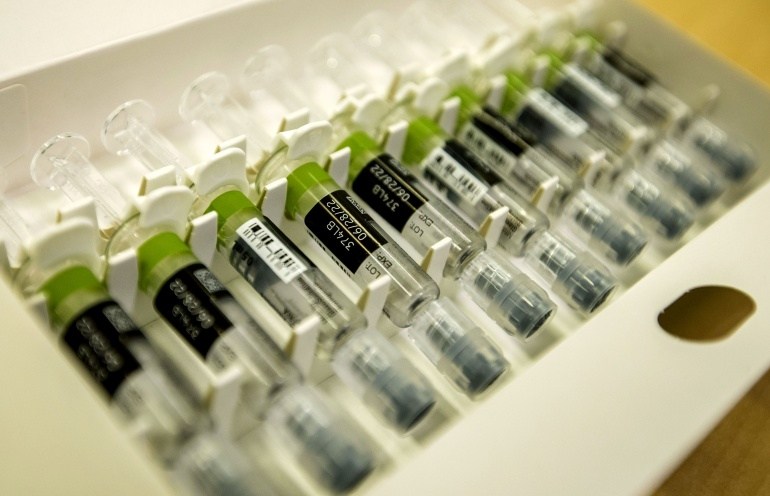As several candidate coronavirus vaccines have entered the last testing phases, Belgian health officials have stepped in to explain how an effective vaccine could work.
The principle of it is to bring a person into contact with a particle of the virus, so they can build up a defence against the virus without becoming ill. "To be clear, that virus particle, which we call an antigen, is not alive," said virologist Boudewijn Catry.
In the case of Covid-19, this antigen is a protein that sticks out of the structure of the virus, like a thorn, also called a 'spike'. This is the entry gate of the virus, against which a defence will then be built up.
"This method is similar to how the flu vaccine is composed. After injection, our body will be able to react in two ways to combat the virus," Catry said.
On the one hand, the body reacts with antibodies, which will specifically neutralise the virus component. On the other hand, it trains the immune system to attack specific blood cells, to prevent further spread within the body.
Related News
- No serious side effects in Belgian subjects for coronavirus vaccine so far
- AstraZeneca's coronavirus vaccine trials halted to assess appearance of 'serious side effect'
- When do we get a vaccine? 5 plans, no answer
Not all types of vaccines offer the same kind of protection, however. "Sometimes it fully protects us, sometimes it only prevents the severity of the symptoms," Catry explained, adding that it can also prevent us from infecting others.
At the moment, it is not yet clear what type of protection the Covid-19 vaccines will offer, and for how long. "The vaccine against measles, for example, protects us for life. The flu vaccination must be renewed annually," he added.
International research into a potential vaccine is being completed more quickly than for other vaccines, Catry said, "but without taking any risks with regard to the sequence of the classic development phase."
Several vaccines have now reached the clinical phase with tests on humans. In the first phase, safety tests are carried out and the optimal dose is found in a few dozen people.
In the second phase, the reaction in a few hundred test subjects is compared to the reaction in Covid-19 patients who have already recovered.
"Then, in the third, crucial phase, we check whether people are protected if they have come into contact with the virus in the community," said Catry. "We are talking about thousands of people, at this point."
Some of them receive a placebo, which is an injection without the vaccine in it. "That is how we get thorough evidence as to whether or not a vaccine really works," Catry said.
On Wednesday, the trials in the final stage of the AstraZeneca vaccine were halted after one person developed "a serious side effect." An independent committee will now investigate whether the side effects are accidental or due to the candidate vaccine.
"This proves, once again, that the correct procedures are followed and that the vaccine will only be on the market if it is safe and effective," Catry said.
The first vaccine in Belgium is expected in the spring, and the Federal Medicine Agency (FAMHP) will closely monitor its effectiveness and safety.
Maïthé Chini
The Brussels Times

